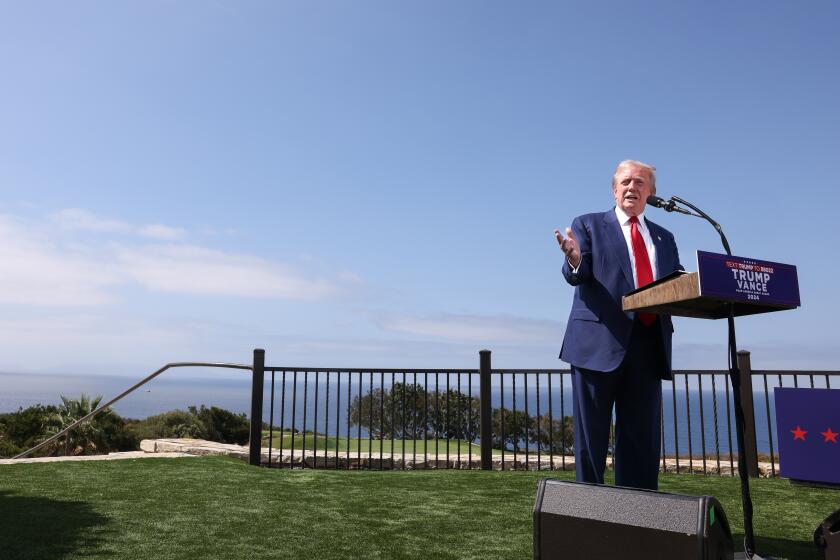No More Tax Cuts Planned, President Says
President Bush indicated Wednesday that the era of across-the-board tax cuts was over, at least for now, as he expressed confidence that his earlier tax cuts would turn the economy around.
“I firmly believe that what we have done was the absolute right course of action in order to help people find a job,” Bush told reporters after meeting with his top economic advisors at his ranch.
The president added that he was “upbeat about the chances for our fellow citizens who are looking for work to be able to find a job.”
Still, he left open the possibility of proposing more dramatic actions, if warranted.
“Things change in the economy, as you know; but as of this moment, we feel like the plans we have in place are robust enough to create jobs,” Bush said.
“If we change our opinion, we’ll let you know,” he added.
Several of the president’s advisors said later that ideas for additional actions were discussed, but no decisions were made.
“A lot of ideas were talked about,” said N. Gregory Mankiw, chairman of the White House Council of Economic Advisers. White House Chief of Staff Andrew H. Card Jr. described the talks as “a pragmatic analysis of the current situation.”
He confirmed that Bush does not believe another tax cut is in order any time soon.
“The president doesn’t have a plan to initiate a discussion about another tax cut right now,” Card said. Bush wants to assess the full effect of his earlier tax cuts, the benefits of which, Card added, are just beginning to ripple across the economy.
During a 13-minute question-and-answer session with reporters before holding a lunch for members of his economic team, Bush also renewed his call for congressional enactment of a national energy plan and medical liability reform.
On other topics, the president:
* Said commercial air travel in the United States was safe from terrorist attack, citing as “a pretty good example” an international sting operation that apprehended a British arms dealer this week for allegedly trying to sell a surface-to-air missile that could be used to shoot down airplanes.
* Reaffirmed his commitment to deploy Marines to help African troops provide humanitarian relief in Liberia.
* Reiterated his belief that his goal of a nuclear weapons-free North Korea can be realized “in a peaceful way,” adding: “And we’re making good progress.”
Bush seemed to be in a jocular mood. At one point he interrupted a reporter who asked: “If a Democrat were president and running -- “
“Wait a minute,” Bush said. “Let me stop you there. They say the silliest things during political season. And sometimes, people ask the silliest questions. Be careful, be careful.”
The overarching topic of the day, however, was no laughing matter to the president and his economic team.
More than 2 million jobs overall have vanished during the last 2 1/2 years.
Other economic signs point to brighter times ahead. On Wednesday, for example, the Commerce Department reported that retail sales rose a brisk 1.4% in July. Retail sales have grown every month since declining in April.
But the job market -- to most Americans, the most important part of the economy -- has not responded. The “jobless recovery” has brought scant comfort to the 9.1 million Americans out of work -- or the millions more who worry that they might soon join that unfortunate group.
Surveys show the economy to be one of Bush’s vulnerable points. A Washington Post poll published Wednesday found that about as many respondents -- one-third -- said the economy was worsening as said it was improving. While 59% of respondents approved of Bush’s handling of his job in general, only 45% supported his handling of the economy and 41% approved of his management of the budget deficit.
Bush was unapologetic when asked about the projected $455-billion budget deficit and cited a number of factors; among them, he said, were a recession that he inherited and the Sept. 11 terrorist attacks that deepened the downturn.
He also blamed the deficit, in part, on the new spending for homeland security and the war on terrorism.
“So I look forward to taking this debate on. I really do. We did the right thing when it came to tax relief,” Bush said. “We inherited a tough situation.”
In addition to Mankiw, the participants in the discussions at Bush’s ranch included Treasury Secretary John W. Snow, Commerce Secretary Don Evans, Labor Secretary Elaine Chao and Joshua B. Bolten, director of the Office of Management and Budget.
Snow, asked about the deficit in an interview Wednesday on the financial cable channel CNBC, said: “We’re committed to seeing that deficit come down. It’s too large.”
Bush has vowed to halve the deficit by 2005.
Democrats were quick to attack Bush’s economic agenda.
“Since January of 2001, the economy has lost 3.2 million private-sector jobs, unemployment has increased from 4.1% to 6.2% and the number of workers unemployed for more than six months has tripled to 2 million, and a projected budget surplus of $5.6 trillion has been replaced by a projected deficit of more than $3 trillion over the same 10-year period,” said Rep. Charles W. Stenholm (D-Texas), a centrist.
“Back here in West Texas, we have a saying: ‘When you find yourself in a hole, the first rule is to quit digging,’ ” he said.
Rep. Richard A. Gephardt (D-Mo.), a contender for his party’s presidential nomination, derided the session at Bush’s ranch as “photo-op economics.”
Referring to the job losses, he called it “ironic that this White House views an economic summit as a special occasion. President Bush’s public relations cover-up for the worst jobs record since Herbert Hoover isn’t working.”
More to Read
Get the L.A. Times Politics newsletter
Deeply reported insights into legislation, politics and policy from Sacramento, Washington and beyond. In your inbox three times per week.
You may occasionally receive promotional content from the Los Angeles Times.










